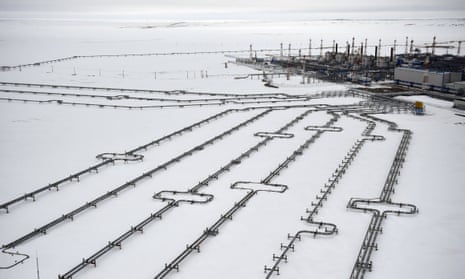Russia has no plans to rein in its production of fossil fuels in the coming decades despite the global efforts to shift towards low-carbon energy, according to its energy minister.
Alexander Novak told the Guardian that Russia did “not see that we will achieve a peak in [gas] production anytime soon” because the world’s appetite for gas would continue to grow in the decades ahead despite its growing number of climate targets.
Instead, during a crucial decade in the battle to keep a lid on rising global temperatures, Russia will pair a 50% growth in gas production with plans to become a global leader in producing clean-burning hydrogen and developing carbon capture technology.
Russia intends to ramp up gas production from its vast and inexpensive reserves to reach 1tn cubic meters a year by 2035, from just under 680bn cubic meters last year.
It also plans to increase the amount of gas it exports on giant super-chilled tankers more than four-fold, from 29m tonnes a year to 120-140m tonnes, while continuing to send about 200bn cubic meters of gas to Europe via pipelines including the politically contentious Nord Stream project.
“I believe natural gas to be an eco-friendly energy source,” said Novak. “We believe that the share of natural gas in the global energy mix will only increase. We believe this to apply not only to Europe, but globally too.”
Energy economists forecast that demand for gas will continue to grow, particularly in Asia, as more countries draw a line on burning coal, which emits almost double the carbon dioxide of gas. But EU demand for gas, of which 30% is met by Russia’s state gas monopoly Gazprom, could fall 8% below 2019 levels by the end of the decade, according to the latest report from the International Energy Agency.
Novak said Russia also planned to become a global player in the hydrogen economy, by producing and transporting the clean-burning alternative to traditional fossil fuel gas.
Hydrogen can be produced either by using renewable energy to split water molecules in a process known as electrolysis, or by splitting off the carbon dioxide from gas through pyrolysis. Novak said Russia was able to do both and was also developing technology to capture the carbon emissions created during hydrogen production to offer a genuinely “green” gas to its customers using Russia’s existing gas transport channels.
“All this has been quite expensive so far, but we believe that just like with the renewable energy sources, prices will go down over time, which will determine the pace of hydrogen adoption. To put it briefly, we can produce hydrogen and use it, as well as deliver it to consumers. We can also export the hydrogen production technologies,” Novak said.
Pursuing hydrogen production would safeguard Russia’s fossil fuel economy while helping to reduce emissions worldwide. But environmental groups, including Carbon Action Tracker, have nonetheless branded Russia’s climate plans “critically insufficient”.
The emissions targets set through the Paris Agreement are set against levels in 1990, which for Russia marked its highest emissions on record. The collapse of Soviet-era industries in the early 1990s halved the country’s emissions within a matter of years, meaning it would take very little effort for the Kremlin to record emissions which are between 25-30% lower than levels in 1990 by 2030.
Novak said: “We are working very actively in Russia, pursuing the climate agenda, working to decrease the greenhouse and CO2 emissions, and we’re working on these issues on a systematic basis.”
